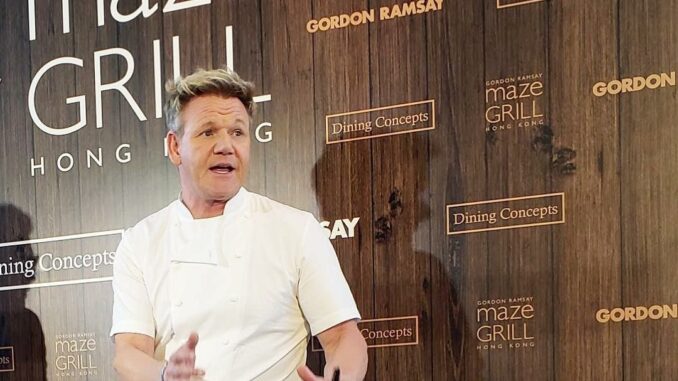
When most people hear the name Gordon Ramsay, they think of the intense chef barking orders in Hell’s Kitchen, the quick-witted critic on MasterChef, or the culinary savior in Kitchen Nightmares. But behind the high-energy TV persona is a master strategist who has transformed his passion for food into one of the most successful personal brands in the world. Ramsay is more than a chef—he’s a global business empire, and his story is as much about entrepreneurship as it is about cooking.
From Fine Dining to a Global Brand
Ramsay’s journey began in the unforgiving world of fine dining, training under culinary giants like Marco Pierre White, Guy Savoy, and Joël Robuchon. His early years were defined by discipline, precision, and the relentless pursuit of culinary perfection. This commitment paid off—by the late 1990s, his flagship restaurant, Restaurant Gordon Ramsay in London, had earned the coveted three Michelin stars.
But Ramsay wasn’t content with culinary accolades alone. He understood early on that the modern food industry was evolving, and that long-term success required more than excellence in the kitchen. Fine dining could establish his credibility, but building a global brand would require vision, diversification, and an ability to connect with audiences far beyond the dining room.
Building a Restaurant Empire
Today, Ramsay’s restaurant portfolio spans continents, with locations in Europe, North America, Asia, and the Middle East. From ultra-luxury dining experiences like Petrus in London to more casual concepts such as Bread Street Kitchen and Gordon Ramsay Burger, his empire caters to a wide range of customers and price points.
This diversity is no accident—it’s part of a carefully calculated strategy. Ramsay knows that the global food market is multifaceted, and by offering multiple dining concepts, he can reach different demographics without diluting his brand. Whether a customer is paying for a Michelin-starred tasting menu or grabbing a quick gourmet burger, they’re buying into the Gordon Ramsay experience—a promise of quality, style, and attention to detail.
Television: The Marketing Machine
If his restaurants are the heart of his business, television is the engine that powers his global reach. Ramsay’s breakthrough moment came with Boiling Point in the late 1990s, but it was Hell’s Kitchen that turned him into a household name. Since then, he has built a television portfolio that includes MasterChef, Kitchen Nightmares, Hotel Hell, 24 Hours to Hell and Back, and Gordon Ramsay: Uncharted.
These shows do more than entertain—they serve as a constant marketing campaign for his brand. Viewers get to see Ramsay’s personality, his culinary philosophy, and his uncompromising standards. The drama and passion on screen translate into brand loyalty, driving interest in his restaurants, cookbooks, and other ventures.
Ramsay has also mastered the art of adapting his television persona for different audiences. While Hell’s Kitchen thrives on intensity, MasterChef Junior shows a more nurturing side, proving that his brand can be as versatile as it is consistent.
The Social Media Play
In the digital era, Ramsay has leveraged social media with the same precision he applies to his cooking. His TikTok presence—particularly his comedic “rating” of amateur cooking videos—has gone viral, introducing him to a younger audience who may never have seen an episode of Hell’s Kitchen. On Instagram and YouTube, he shares cooking tips, behind-the-scenes glimpses, and family moments, balancing his fierce professional image with a relatable human side.
This online strategy keeps him relevant, helps him connect with fans in real time, and creates a constant stream of content that reinforces his brand values: quality, passion, and personality.
Attention to Detail: The Secret Ingredient
Perhaps the most overlooked aspect of Ramsay’s business success is his obsession with detail. Whether it’s the interior lighting of a new restaurant, the texture of a dish, or the way staff interact with guests, Ramsay maintains rigorous standards across every venture. This consistency builds trust—customers know that whether they’re dining in London, Las Vegas, or Dubai, the experience will meet the same high expectations.
Even in his more casual restaurants, there’s a level of refinement that elevates the experience. It’s this unwavering commitment to quality that allows Ramsay to charge a premium for his brand—and for customers to happily pay it.
Diversifying Beyond the Plate
While food is at the core of his empire, Ramsay has expanded into cookbooks, kitchenware, culinary travel experiences, and even mobile games. Each new venture is carefully aligned with his brand identity. His products are not just merchandise—they’re extensions of the Gordon Ramsay lifestyle, offering fans a taste of his expertise in their own homes.
He’s also tapped into the growing trend of experiential dining and immersive events, creating opportunities for customers to interact with his brand in ways that go beyond a traditional meal. From live cooking demonstrations to chef’s table experiences, Ramsay understands that today’s consumers value memorable experiences as much as they value the food itself.
A Brand Built on Adaptability
Ramsay’s success also stems from his ability to adapt. He has embraced culinary trends without chasing fads, integrated digital content into his marketing long before it was standard, and adjusted his restaurant concepts to suit different markets. Whether it’s offering plant-based dishes to appeal to changing dietary preferences or opening more casual dining spots to meet demand, Ramsay evolves while staying true to his core values.
This adaptability ensures his brand remains competitive in an industry where many celebrity chefs fade after their initial wave of fame.
The Empire in Numbers
Today, Gordon Ramsay’s net worth is estimated in the hundreds of millions of dollars, with dozens of restaurants, multiple Michelin stars, and a media empire that spans the globe. His influence reaches millions each week through television, social media, and in-person dining experiences.
But despite this financial success, Ramsay shows no signs of slowing down. In interviews, he often talks about his hunger for new challenges—whether it’s opening in an untapped market, developing fresh television formats, or exploring new ways to connect with audiences.
